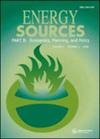Social acceptance, sources of inequality, and autonomy issues toward sustainable energy transition
IF 2.2
4区 工程技术
Q3 ENERGY & FUELS
Energy Sources Part B-Economics Planning and Policy
Pub Date : 2022-09-27
DOI:10.1080/15567249.2022.2121383
引用次数: 1
Abstract
The global energy and climate agenda has been progressing fast, going through different stages and coevolved with scientific advancements (Nikas et al. 2021). In order to reach carbon neutrality, the Intergovernmental Panel on Climate Change (Shukla et al. 2022), clearly states the importance of a multi-pronged approach based, among others, on: phasing out fossil fuels, using renewable energy sources and improving energy efficiency for both supply and demand (Salvia et al. 2021). Despite the beneficiary impact of the transition to cleaner energy, there are various idiosyncratic effects which should also be treated, not only technical, but of social, economic, and political nature (Marinakis et al. 2020). Implementation of appropriate energy policies necessitates the understanding of the level of their social acceptance. Technology and social conflicts may have mutual effects, entailing the potential rejection of technologies and projects by the general public. Therefore, it is important to acquire further knowledge on the components of social acceptance to promote policies and projects implementation toward improving community welfare. To meet sustainability goals, numerous policies have focused on the overall electricity demand. In this direction, the issue of inequality in electricity consumption has attracted growing concerns. In this spirit, investigating the factors affecting electricity consumption is fundamental toward (a) understanding households’ inability to maintain adequate levels of energy and (b) alleviating energy poverty in general (Doukas and Marinakis 2020). At technical level, the integration of renewable energy will be a crucial feature of energy systems, which entails a deep understanding of energy networks (Taylor et al. 2022). In this context, there is a growing debate concerning the role of decentralized and distributed solutions. It is therefore required to formulate evaluation methods that allow cooperation among the different factors toward promoting local energy transition solutions (Ha and Kumar 2021). Moreover, in addition to the established solutions of the solar and wind industry, the focus can also be directed toward the development of less conventional solutions such as the geothermal energy projects. The present Special Issue of the Sustainable Development of Energy, Water and Environment Systems 2020 Conference (SDEWES2020) aims to contribute to the debate on the aforementioned subjects, as well as to the analysis of the effective policies toward a well-established transition of the energy sector.可持续能源转型的社会接受度、不平等的来源和自主性问题
全球能源和气候议程进展迅速,经历了不同的阶段,并与科学进步共同发展(Nikas et al. 2021)。为了实现碳中和,政府间气候变化专门委员会(Shukla et al. 2022)明确指出了多管齐下的重要性,其中包括:逐步淘汰化石燃料,使用可再生能源,提高供需双方的能源效率(Salvia et al. 2021)。尽管向清洁能源过渡带来了受益者的影响,但也有各种特殊的影响,不仅是技术上的,而且是社会、经济和政治性质的(Marinakis et al. 2020)。执行适当的能源政策必须了解其社会接受程度。技术和社会冲突可能相互影响,导致技术和项目可能被公众拒绝。因此,重要的是进一步了解社会接受的组成部分,以促进政策和项目的实施,以改善社区福利。为了实现可持续发展目标,许多政策都侧重于总体电力需求。在这个方向上,电力消费不平等的问题引起了越来越多的关注。本着这种精神,调查影响电力消费的因素对于(a)了解家庭无法维持足够的能源水平和(b)普遍减轻能源贫困至关重要(Doukas和Marinakis 2020)。在技术层面,可再生能源的整合将是能源系统的一个关键特征,这需要对能源网络的深刻理解(Taylor et al. 2022)。在这种情况下,关于分散和分布式解决方案的作用的争论越来越多。因此,需要制定评估方法,允许不同因素之间的合作,以促进当地的能源转型解决方案(Ha和Kumar 2021)。此外,除了太阳能和风能工业的既定解决方案外,还可以将重点放在开发不太传统的解决方案上,例如地热能项目。2020年能源、水和环境系统可持续发展会议(SDEWES2020)的本期特刊旨在促进对上述主题的辩论,并分析实现能源部门成熟转型的有效政策。
本文章由计算机程序翻译,如有差异,请以英文原文为准。
求助全文
约1分钟内获得全文
求助全文
来源期刊

Energy Sources Part B-Economics Planning and Policy
ENERGY & FUELS-
CiteScore
6.80
自引率
12.80%
发文量
42
审稿时长
6-12 weeks
期刊介绍:
12 issues per year
Abstracted and/or indexed in: Applied Science & Technology Index; API Abstracts/Literature; Automatic Subject Index Citation; BIOSIS Previews; Cabell’s Directory of Publishing Opportunities in Economics and Finance; Chemical Abstracts; CSA Aquatic Science & Fisheries Abstracts; CSA Environmental Sciences & Pollution Management Database; CSA Pollution Abstracts; Current Contents/Engineering, Technology & Applied Sciences; Directory of Industry Data Sources; Economic Abstracts; Electrical and Electronics Abstracts; Energy Information Abstracts; Energy Research Abstracts; Engineering Index Monthly; Environmental Abstracts; Environmental Periodicals Bibliography (EPB); International Abstracts in Operations Research; Operations/Research/Management Science Abstracts; Petroleum Abstracts; Physikalische Berichte; and Science Citation Index.
Taylor & Francis make every effort to ensure the accuracy of all the information (the "Content") contained in our publications. However, Taylor & Francis, our agents, and our licensors make no representations or warranties whatsoever as to the accuracy, completeness, or suitability for any purpose of the Content. Any opinions and views expressed in this publication are the opinions and views of the authors, and are not the views of or endorsed by Taylor & Francis. The accuracy of the Content should not be relied upon and should be independently verified with primary sources of information. Taylor & Francis shall not be liable for any losses, actions, claims, proceedings, demands, costs, expenses, damages, and other liabilities whatsoever or howsoever caused arising directly or indirectly in connection with, in relation to, or arising out of the use of the Content. Terms & Conditions of access and use can be found at http://www.tandfonline.com/page/terms-and-conditions .
 求助内容:
求助内容: 应助结果提醒方式:
应助结果提醒方式:


